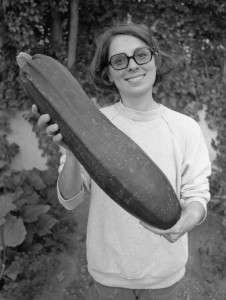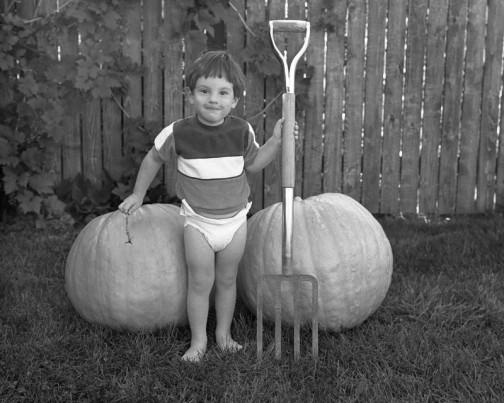If you live in the Salt Lake Valley, you know the importance of water, which hereabouts accumulates in the mountains during the winter in the form of snow. Come spring, the snowpack melts and mountain streams swell. Said streams feed reservoirs and canals and pipelines and irrigation ditches, which distribute water to gardens and orchards across the valley. At least, that’s the way it used to be. Nowadays, only a handful of domestic properties abut an irrigation ditch. I was lucky once to own such a property—or at least I thought I was lucky.
It was our first house—a modest bungalow situated approximately thirty blocks south of the apartment we’d been renting in the Avenues. There, Anne and I had been cultivating a tiny plot in the corner of the parking lot, growing mostly zucchini squash the size of atomic submarines. This because we didn’t understand that zucchini squash should be picked early and often. We also grew tomatoes, because nowhere can you buy a tomato that tastes half as good as one fresh from the garden.
I wasn’t very excited about moving to the suburbs until the realtor showed us the backyard. It was half a block deep, with a raspberry patch, two pear trees, two apple trees, three peach trees, one nectarine tree. Along the back side of the lot ran a concrete ditch. Turns out our yard was the very last along a network known as the White Ditch Irrigation Company. As a property owner, I was entitled to one share of the water that comes down that ditch, or 44 minutes per week. That’s a lot of water!
I bought a rototiller and soon had several dozen rows of vegetables under cultivation. I planted an apricot tree. We bought canning equipment.
One day our upstream neighbor, the widow Mrs. Madsen, asked if I would like to cultivate her backyard, which had lain fallow since the death of her husband. I agreed, and began saving up for a tractor.
But then something awful happened. Mrs. Madsen died, and her house was sold to a fellow I shall call Rambo. Rambo’s last name was Farmer; however, he had no interest in farming. Mainly he was interested in guns, and he also liked to irrigate–evidently because the word rhymes with irritate. He’d divert water from the ditch not just for 44 minutes but for 44 hours—however long it took before the resulting lake would spread into my yard, washing away my tomato plants and turning my yard into a swamp. I tried speaking to him, but all that came of that was still more water. I tried calling the irrigation company, but it turns out the White Ditch Irrigation Company is run by elderly gentlemen who have no means of enforcing the rules.
Things were different in pioneer times. In pioneer times, irrigation rules were enforced by a fellow known as the ditch rider. Almost always, the ditch rider was a Mormon bishop armed with a shovel. Give the ditch rider any guff and he’d smack you upside the head with his shovel. End of problem.
I heard this story told so many times, from so many sources, that I concluded it must be an urban legend, and thus submitted it to the noted folklorist Jan Harold Brunvand. Professor Brunvand agreed it smacks of urban legend, in that the shovel wielder is always a Mormon bishop—a person tasked with resolving domestic issues in a calm and reasoned manner. Also, like an Aesop fable, the story has a moral: He who messes with irrigation water will receive a well-deserved brain concussion.
Sadly, the LDS ward I lived in at the time wasn’t led by a homicidal maniac. And even if it were, I most likely couldn’t count on the bishop’s services. Although I’m still listed on the rolls as a member, I haven’t attended church for over half a century. I don’t pay tithing, I don’t own a Book of Mormon. I’m married to a Jew.
Oh, that was the other thing. Rambo didn’t care for Jews. “Hitler,” he once told me, “had some good ideas.” So now at last I knew the reason behind the recurring floods. “And if the water doesn’t wash you out,” Rambo vowed, “I’ll burn you out!”
I decided it was time to involve the police. After speaking with Rambo, the officer advised me that the wise course of action would be to move. “Your neighbor is clearly crazy,” he said, “but we can’t really do anything about it until after he kills you. Which he will, sooner or later.”
So we moved, taking with us the clothes on our backs and two gigantic pumpkins we had grown. Our son Alex was still in diapers then. Today, he programs interstellar robots for NASA.
Me? I’ve never grown another giant pumpkin, and I’m obliged to nibble on store-bought tomatoes that taste like cardboard. On the plus side, my current neighbors aren’t nuts. I’m generally well respected except down south in the Gun Belt—where I’m remembered as the coward of the county who fled with his tail between his legs.
As for Rambo, I’ve been told he packed up his guns and moved on—to northern Idaho. There are pockets of white supremacists in the panhandle, so I presume that he, like me, has gone to a “better place.” That is, unless someone has taken a shovel and put him out of our collective misery.

